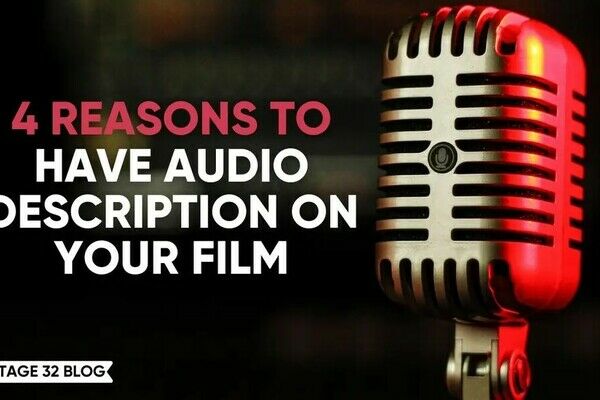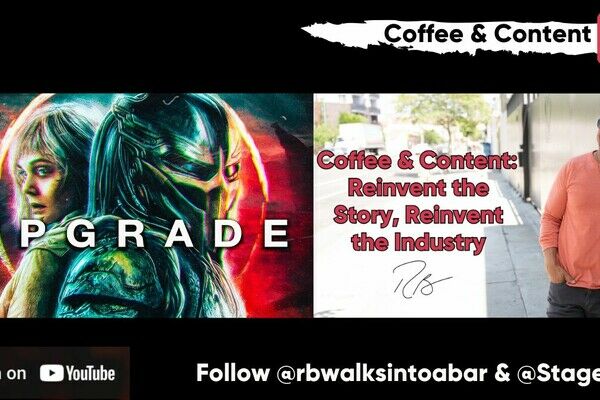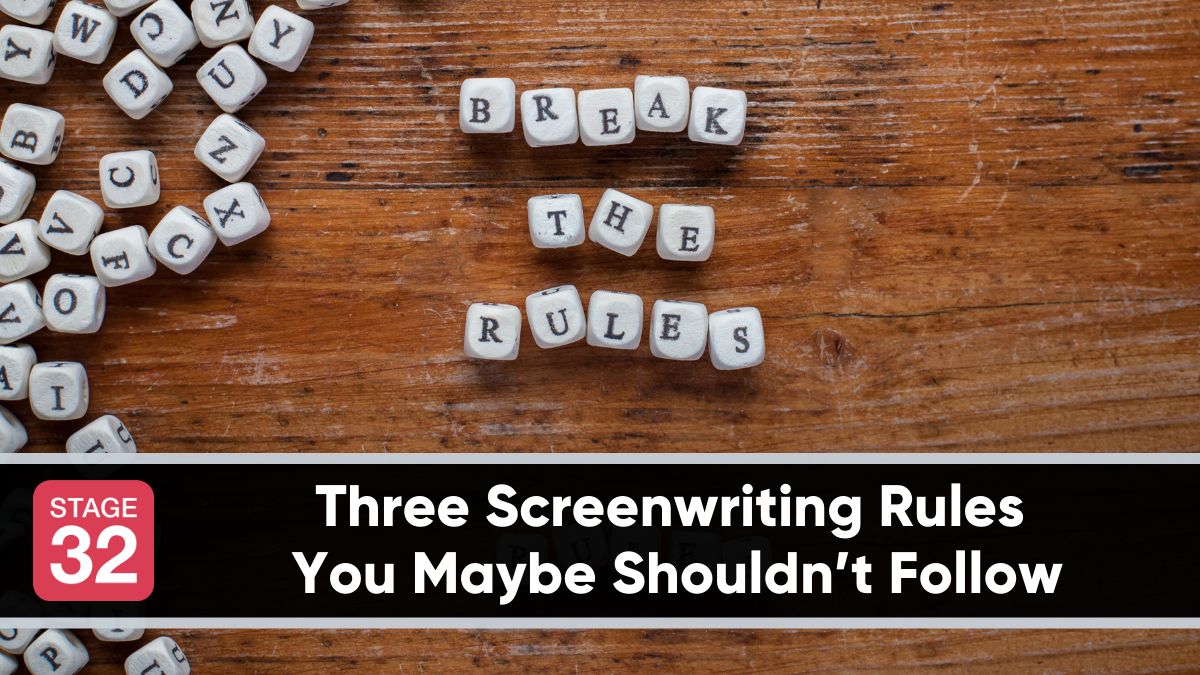Three Screenwriting Rules You Maybe Shouldn’t Follow
Writers know there are certain edicts to be followed. Don’t go over 120 pages. Or under ninety. Show, don’t tell. Get in late, get out early (to a scene, not a working day). All good. Those are easy. There are some tenets, though, that, as you’ve been around awhile, don’t make a whole lot of practical sense. I’ve picked my top three upon which to muse. Or ramble. Your call.
First let me say that I am no one of any repute, and you should take my opinion’s value for exactly what you paid for it. However, I make my living as a writer. Nothing big, but enough to keep myself clothed and fed, and my grandchildren spoiled, which at my age is pretty much all that matters. I get rejected by a much higher level of execs every passing year, a dubious but objective sign of progress. And I have a small but viable network of credited industry pros who will take my calls. So, grain of salt and all that. But I’m not a hack.

Rule One: Knock ‘em dead with your first ten.
First up, the idea that the first ten pages will sell or kill the reaction to your script. I don’t argue that particular point, but I do think writers tend to take it much too literally. Your first ten pages should kick-ass, but – hear me out – your first ten should be your worst ten. Yes, you read that right. If they are not, then by definition, your script goes downhill from there. And who wants to be let down for another ninety pages of a read? Nobody. Especially nobody who makes movies.
The mistake a lot of writers make is to put their best set pieces, the funniest lines of dialogue, and/or the most emotive exchanges in the first ten pages, just to make sure they’re following the imperative to capture the reader’s attention so much that they finish the read. Then those writers scramble creatively to meet the standard they’ve set. And as someone who reads a lot of scripts for work and for relaxation, I can tell you that they almost always fail. The focus shouldn’t be on making that first ten pages the attention-grabber. You build to that. The first ten sets the stage for the build.
Let me back up. If you’re paying for a read, or you’ve submitted somewhere that has a reader doing coverage, your script is not going to get put down even if the first ten aren’t good, much less groundbreaking. The reader has to finish it. So put that part out of your mind. But a submission to a search, or a request from a logline, pitch, or synopsis…? Yeah, they’ll drop that in a minute. But what you need to worry about more is the attitude the reader has during and after that first ten.
Your scale is: [5] Holy sh*t! (Don’t care where the phone is.) [4] Hey, this is damn good. (Ignores phone notifications.) [3] Good stuff so far. (Checks phone; puts it down.) [2] Oh, God. There goes my night. (Scrolls feed for two hours before reading.) [1] Nope. I’m not doing this. (Calls you names, binge watches a season of Ozark.)
The job of your first ten is to hit [3] and above. More than anything, the reader needs to know that you can handle yourself with a story. Then they can look forward to the rest. That’s where you knock them out. Do you want to wow them with your mind-blowing scenes right off the bat? Go right ahead. But you’d better be ready to deliver whatever verb outranks ‘wow’ on their scale for the rest of the ninety-page way.
I say – given you have a good premise and a compelling character to carry the plot – use the first ten to show the reader you know what the eff you’re doing. Your voice means everything. Craftsmanship is essential. Gangbuster scenes are optional.

Rule Two: Show your personal emotional connection.
Next on my list is the directive that the writer needs to be deeply emotionally connected to the story in order to write it well, and that a personal connection is an essential part of the pitch. Nope. Sometimes, you just recognize a good story when you see it, and you want to be the one to write it. Sometimes you write a comedy just because you think it’s a funny idea. Those are ‘connections’ enough, in my opinion.
Does Tony Gilroy have significant emotional ties to his best work, besides “I can write the hell out of action and thriller scripts.”? Maybe he does, but I don’t care. I would be willing to bet that if any writer showed up with a story as good as the first Bourne movie or Michael Clayton, no producer would care, either. And what would the personal connection to Raising Arizona look like? That would be a comedy in itself.
Don’t get me wrong. If you have a genuine connection to a piece, that’s great. Use it. Capitalize on it. It will probably show in the writing. But don’t stretch yourself trying to find it. And maybe the connection comes as you write it and learn the character, subject, world, whatever. That’ll make you pitch it better. But it drives me crazy to watch writers twist themselves into knots trying to show “Why am I the best one to write this?” Maybe you ain’t. But if it moves you, write it anyway. Or, you have every right to have written it, connection or not.
You’re a writer. You don’t need to justify writing a (hopefully) good story. If you do a good enough job, nobody who wants to buy it is going to walk away because you didn’t have a ‘connection’ opening in your pitch. It’s okay to write something you have absolutely no experience with or investment in. That is (I resisted the urge to write ‘literally,’ but it is) most movies and TV.
Again, just my opinion. But I’m right. Ask Aaron Sorkin – if you can catch him between writing gigs for which he has no personal connection to the material.

Rule Three: Stay in your writing lane.
Okay, the last thing on my list was going to be to challenge the advice to stick to writing one genre. But this has turned into more of a rant than I intended. I wanted to be thoughtful, or at least come off that way. So I’ll wrap up by saying the ‘one genre’ thing is hogwash. Write whatever you can be good at. Except don’t write comedy if you’re not naturally funny to somebody other than your mother and a five-year-old.
Here also, I invoke Aaron Sorkin.
About Sheila Boyd

Sheila Boyd is a screenwriter who does book-to-screenplay adaptations for money, and writes spec scripts for sanity. She has had several options, contest wins, and other affirming but ultimately meaningless successes. She lives in maddeningly red North Carolina only because her grandchildren are there, and swears she does not refer to herself in the third person in real life.
Let's hear your thoughts in the comments below!
Got an idea for a post? Or have you collaborated with Stage 32 members to create a project? We'd love to hear about it. Email Taylor at taylor@stage32.com and let's get your post published!
Please help support your fellow Stage 32ers by sharing this on social. Check out the social media buttons at the top to share on Instagram @stage32online Twitter @stage32 Facebook @stage32 and LinkedIn @stage-32
| How to Run a Successful Voiceover Business in Modern-Day |
| Announcing our 6th Annual Comedy Writing Contest |
Search Stage 32 Blog
There are now 4042 blog posts for you to enjoy. Search them all by tags below.
Acting, Advice, Cinematography, Coffee & Content, Composing, Contests, Distribution, Featured, Filmmaking, Financing, Inspirational, Networking, Producing, Screenwriting, Success Stories, Tips, Trending,Relevant Tags
Recommended Articles

4 Reasons To Have Audio Description On Your Film

Stage 32 Is My Magic Key To International Networking And Education

Insider Intel: 2026 Predictions

Stage 32 Certification Featured In IndieWire!

Coffee & Content: The Genius of Weapons and How to Know When Your Script Is Ready

Find Your Footing on Stage 32: Join Our December Community Open House

Happy Thanksgiving From Stage 32: We Are Thankful For YOU

Coffee & Content: Why Your Pitch Needs to Be Human

Coffee & Content: Low Stakes Stories, High Stakes Decisions






